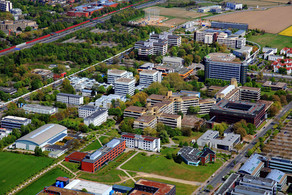Environmental statistics urgently need to be further developed
- TU News

Progressive climate change, a loss of biodiversity and environmental pollution are leading to economic damage of ever greater proportions - and the population is also directly affected by the health impacts. Clear decisions and effective measures are therefore immediately necessary, according to DAGStat. "The cause-effect relationships of the climate crisis are global, complex and difficult to predict. Public debates and political actors therefore need more than ever robust facts and reliable methods," says DAGStat Chair Prof. Katja Ickstadt, who teaches and researches at the Faculty of Statistics at TU Dortmund University.
Three demands on politics

For environmental statistics to be effective for society, they need political support. In their statement, the researchers therefore call on those with political responsibility to act ambitiously. Findings from data analyses of environmental statistics must be taken seriously, they say, and risk assessments must be implemented promptly to mitigate the economic and health impacts of climate change. "For example, pollutants in the air can only be effectively reduced if the limits for emissions in transport and industry, for example, are lowered quickly," explains Prof. Ickstadt.
Furthermore, independent research in the field of environmental statistics and environmental action at universities needs to be strengthened and better financed in order to be able to implement necessary research projects and to ensure continuity independent of political structures and processes. Professorships should be created and subsequently special research areas and priority programs should be established.
For environmental statistics to explore and evaluate the complex interrelationships of environmental action in an evidence-based manner, extensive access to research data is needed. The resources would have to be usable in a secure, transparent, and privacy-compliant manner. DAGStat therefore expects that the Research Data Act announced by the German government, which is intended to provide faster and easier access to data, will be passed quickly.
Environmental statistics cover different areas
In their statement, the authors also describe the current state of knowledge and central methods in key areas of environmental statistics: For example, environmental epidemiology researches the effects of environmental factors on the health of the population. In the field of environmental action, statisticians investigate the attitudes of the population towards climate protection as well as their actions and the acceptance of political measures. Modern and partly new statistical methods are developed in order to grasp the complex phenomenon of climate change and to develop evidence-based ways to mitigate the climate crisis.
The researchers also formulate recommendations for all colleagues involved in environmental statistics: In view of the limited resources, priorities should be set and complex questions should be dealt with in an interdisciplinary way whenever possible. Furthermore, the statisticians are called upon to communicate their results to society and politics in an understandable way, so that they can be used for current debates and decisions.
In addition to the statement, ten particularly relevant statistical methods are presented in a generally understandable way in a handout, which is aimed not only at statisticians, but also at politicians and the interested public.
A total of 19 researchers from ten German scientific institutions as well as from the Federal Environment Agency and the Federal Statistical Office contributed to the DAGStat statement. From the TU Dortmund University, in addition to three scientists from the Faculty of Statistics - the only one of its kind in the German-speaking world - Prof. Christina Elmer from the Institute of Journalism was also involved as an expert in the field of data journalism.
About DAGStat:
The German Working Group on Statistics unites 15 scientific societies and the Federal Statistical Office under its umbrella. Its goal is to further develop statistical theory and methodology and to provide a forum for scientific exchange. Prof. Katja Ickstadt has been chairwoman of DAGStat since March 2022.
To the statement and the handout
Symposium:
On March 24, DAGStat and the German Federal Office for Risk Assessment (BfR) will jointly host a symposium at which experts* in the field of environmental statistics will discuss the latest methods and developments.
Further information on the symposium
(Annotation: The quotations have been translated.)
Contact person for further inquiries:



